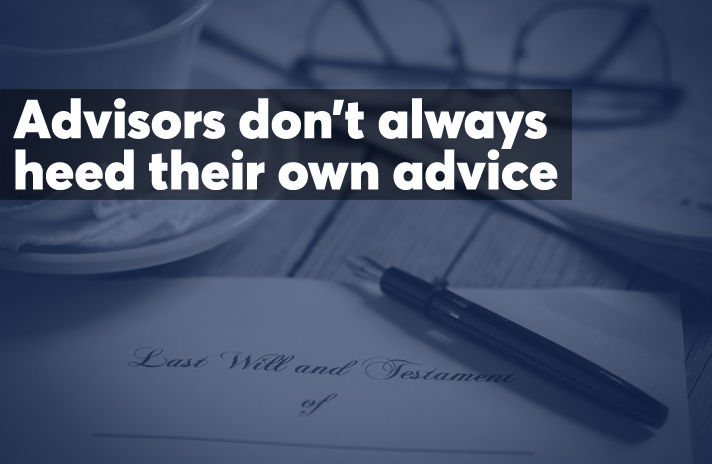
Although they do their utmost to hammer home the importance of proper planning, advisors don’t necessarily follow their own words of wisdom. They can fall victim to the same behavioral biases as their clients and end up making questionable financial decisions.
Overconfidence is one such cognitive bias that often affects advisors, says Stephen Wendel, head of behavioral science at Morningstar. He calls it the Lake Wobegon effect, named after the mythical town in the radio show “A Prairie Home Companion,” where “all the women are strong, all the men are good-looking and all children are above average.”
Part of the joke is that not everyone can be above average. But advisors can get caught up in the idea that since they’re experts, they are assured of not doing worse than those who aren’t experts. As a result, they can end up neglecting their own best interests.
“We might give advice to somebody else thinking they are average, but of course we’re not average, so that advice doesn’t apply to us,” he says.
Of course, this is true of people across many professions. The saying that doctors make the worst patients is a cliché for a reason.
Academics in the field agree. Advisors can also fall victim to status-quo bias, procrastinating or experiencing inertia “where we make all types of decisions, especially financial decisions,” says Victor Ricciardi, a finance professor at Goucher College. “The idea is that people don’t like change … and even advisors will not necessarily update their own estate planning.”
Although it’s impossible for someone to avoid all behavioral biases, Ricciardi suggests that planners need to understand these instincts better to help them in advising clients who are facing the same issues.
Confessing Financial Sins
To that end, some brave advisors were willing to fess up and admit their financial sins to Financial Planning.
The most commonly cited issues were failures to budget, a tendency to shy away from tough conversations with family members or knowingly taking on overly risky investments.
Some were even more basic — for instance, not updating important documents or not reviewing retirement plans for years.
Doug Boneparth of Bone Fide Wealth in New York City acknowledges he doesn’t always put money away for his own retirement, which is far in the future, and instead lets it build up in a reserve fund. He says he’s “on this kick of accumulating cash” in order to “feel better” about moving retirement savings down on his list of goals after he and his wife had a child and bought a home a few years ago.
Essentially, he says, he’s being even more conservative for himself than he would recommend for clients.
“Does that conflict with the advice that I give?” he asks. “Not necessarily, but it’s a challenge. Maybe I should be looking closer at that mix about how much goes into retirement versus cash reserves.”
Similarly, Ryan Marshall, a CFP who is a partner at ELA Financial Group in Wyckoff, New Jersey, concedes that he doesn’t review his retirement plans once a year as he does with his clients. Instead, he does such a review only “once every four or five years.”
Risk management is another area where there is a discrepancy between what advisors say and what they actually do.
Matthew Gaffey, senior wealth manager at Corbett Road Investment Management in McLean, Virginia, notes the traditional strategy of having retirees ramp down the risk in their portfolios, which he notes should be more akin to “pumping the brakes rather than slamming them.”
Whereas Gaffey might advise clients to progressively reduce risk in their portfolios over time, he’s more comfortable holding risk in his own investments. He noted that other advisors take that same approach.
On a lighter note, Marshall questions whether retirement will be in his future at all. “I don’t think I want to retire ever,” he says with a laugh. “I’m giving people advice to retire [but] I really like my job. Granted, I’m still young. I’m 36 years old, so I have a lot of time. But I truly enjoy my job.”
Here are some of the major shortcomings that these and other advisors acknowledge when they reflect on things that they’re saying to clients but not actually doing themselves:

Lacking the Patience to Budget
Instead, he takes a shortcut. “I calculated how much I need to save for the retirement that I would like to have and just make sure I save an additional 5% more than that amount each month,” he explains.
“As long as I am putting that away and I have my emergency fund set up, I don’t budget. However, some clients really need to budget. But I don’t have the patience or time to sit down every month and come up with a plan.”

Delaying Updates on Documents
“Yes,” Gagliardi concedes, “this shoemaker is barefoot with regard to estate planning advice.”

Lacking Necessary Discipline
“I think financial advisors see so many investment opportunities that they don’t stay disciplined,” he says. “I have done that at times in my career.”

Paralyzed in Budget Reviews
“However, budgeting seems like such a restrictive thing, which is why many people freeze up when they talk about it and why they don’t stick to it,” Schurig says.
“Since a budget isn’t static, I often don’t take the time to do an emotional audit of my spending and review my budget as often as I should,” she says.
“This is one of the many reasons that working with a financial advisor is so important because they can hold you accountable and remind you to check in when necessary,” she adds.

Avoiding Tough Conversations
“I once had a client with an adult child, perfectly capable of working, who lived off the client,” Pedvis recounted. “One day, after the child asked the client for money to buy a luxury residence, the client asked me what I thought he should do.
“I explained that while it’s ultimately the client’s decision, I thought the residence in question was too extravagant and that if the client wanted to really help the child, he should explain why the child needs to start to fend, at least in part, for himself financially.
“No one likes conflict, especially in family relationships, but I felt it was my job to give the client my honest opinion … I know if the roles were reversed, it would be very hard for me to financially deny a family member because I understand the strain and stress that would put on a relationship.”

Not Mastering Cash Flow
“However, at the end of last year, I did commit to the practice so that I could truly understand what I was asking my clients to do and look into finding solutions to reduce the heavy lifting,” he says. In the end, “it was a very rewarding experience.”

Living Too Lavishly
“[They are] buying a larger home, nicer car, better trips and other toys without having a good budget and/or disciplined savings plan.”

Taking on Too Much Risk
“I believe much of this is driven by our underlying faith in the market performing well over time. Many planners are comfortable taking on that risk with their own money but would be reluctant to ever suggest a client do the same.”





